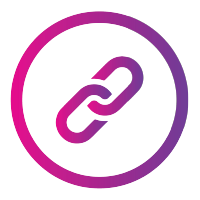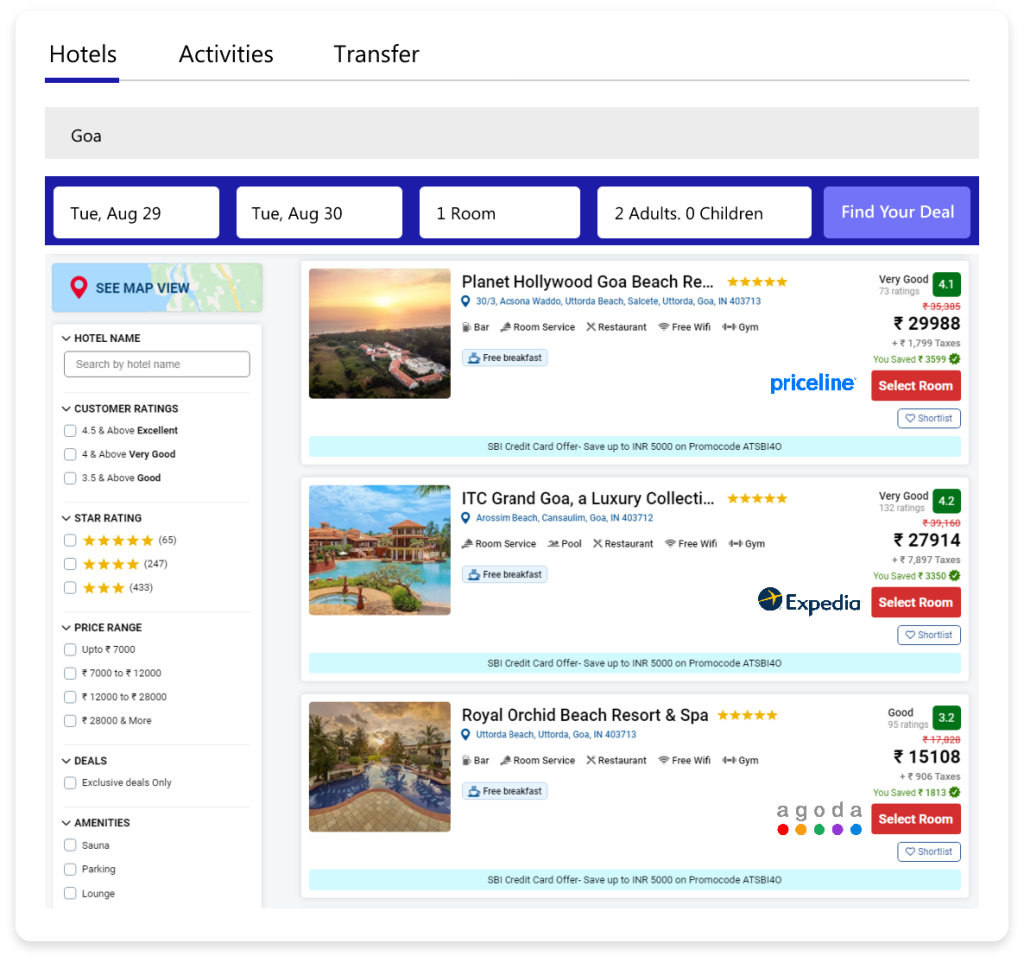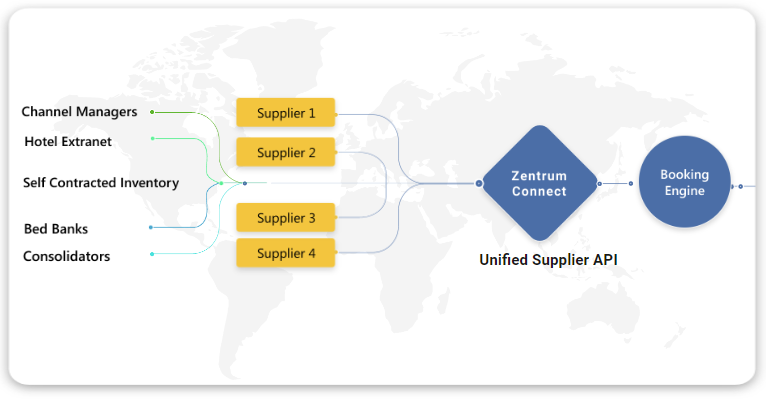What is the Difference Between B2C and B2B Hotel Booking API?
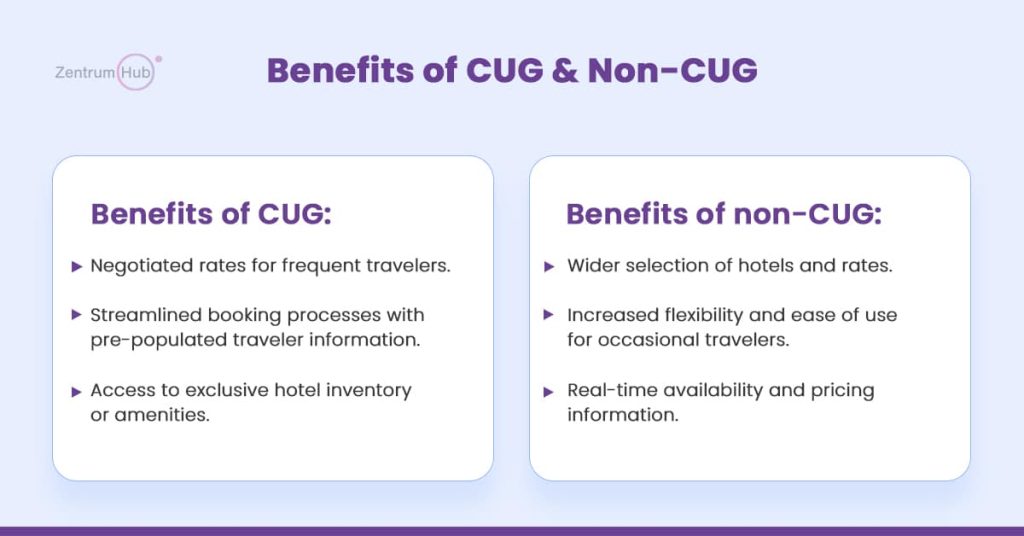
What is the Difference Between B2C and B2B Hotel Booking API? Overview B2B vs. B2C APIs: Understanding the Target Market Understanding the difference between CUG vs. Non-CUG Conclusion The world of hotel booking APIs can be a complex one, especially when you start diving into the different functionalities and target audiences. These APIs extend far beyond simply searching for hotels – they offer a comprehensive suite of features across the B2B (Business-to-Business) and B2C (Business-to-Consumer) landscapes. This blog post aims to be your compass, navigating you through the key differences between B2B and B2C APIs, along with CUG (Closed User Group) and Non-CUG functionalities within the hotel booking space. B2B vs. B2C APIs: Understanding the Target Market The complexities of hotel booking APIs stem from the need to address these diverse functionalities and user groups. Recognizing these distinct needs is fundamental to selecting and utilizing the most appropriate Hotel Booking API for your specific requirements. B2B (Business-to-Business): These Hotel Booking APIs are designed to facilitate connections between businesses. In the context of hotel bookings, a B2B API would enable travel agencies, corporate booking platforms, or tour operators to seamlessly integrate hotel booking functionalities into their existing systems. This empowers them to offer hotel booking services to their clients without the burden of manually managing contracts or inventory with individual hotels. Examples of B2B API Use Cases: A travel management company integrates a B2B API to offer a one-stop shop for corporate clients to book flights, hotels, and car rentals. A tour operator utilizes a B2B hotel booking API integration to streamline hotel bookings for pre-packaged vacation tours. B2C (Business-to-Consumer): B2C APIs cater directly to consumers. This is what you encounter when you use online travel booking platforms or hotel chain websites. These APIs allow consumers to search for hotels, compare prices, and book rooms directly. Examples of B2C API Use Cases: A popular online travel agency leverages a B2C API to allow users to search for hotels based on location, price range, and amenities. A hotel chain utilizes a B2C hotel booking API integration to power their website’s booking engine, enabling guests to seamlessly book rooms directly. Understanding the difference between CUG vs. Non-CUG Having grasped the B2B and B2C landscape, let’s delve into the access control mechanisms employed by hotel booking APIs: CUG (Closed User Group): CUG restricts access to a predefined group of users, typically established through negotiated contracts. In the realm of hotel bookings, this could translate to a corporate travel management company having a CUG agreement with a specific hotel chain. This agreement allows the company’s employees to enjoy exclusive rates or booking privileges unavailable to the public. Benefits of CUG: Negotiated rates for frequent travelers. Streamlined booking processes with pre-populated traveler information. Access to exclusive hotel inventory or amenities. Non-CUG: These are open to a broader audience and adhere to the standard functionalities of B2B or B2C APIs. Anyone with the necessary credentials can access the travel booking portal and conduct their bookings. Benefits of non-CUG: Wider selection of hotels and rates. Increased flexibility and ease of use for occasional travelers. Real-time availability and pricing information. Choosing between CUG and Non-CUG depends on your specific requirements. If you require access to exclusive rates or amenities, a CUG might be the ideal choice. However, if you prioritize wider selection and flexibility, a non-CUG would be more suitable. Want to Learn More? Check Out These Hotel API Blogs Travel API Comparison: 8 Factors for Selecting the Best One Why Do OTAs Need Travel API? Travel APIs: The Cost of Integration for OTAs Travel API Integration: Types, Pricing, Benefits & Timeline How Can Startups and OTAs Maximize Revenue with Hotel Booking APIs? How to Optimize Your Platform with Hotel API Integration? Complete Guide to Hotel API Integration: Costs, Benefits, Technical Challenges in Hotel API Integration and How to Overcome Them How to Choose the Best Hotel API Provider? Key Features to Evaluate Hotel API Integration Costs: Pricing Methods for OTAs Explained What is the Difference Between B2C and B2B Hotel Booking API? Role of Hotel Booking APIs in Hotel Booking Engine? Conclusion Whether you’re a travel company seeking to integrate hotel booking or a hotel chain looking to expand your reach, knowing the target audience and access restrictions will ensure you select the most suitable API solution. By carefully evaluating these factors alongside the B2B, B2C, CUG, and Non-CUG considerations, you can make an informed decision and select the most suitable Hotel Booking API. FAQs: Difference Between B2C and B2B Hotel Booking API? What are the two main types of Hotel Booking APIs? There are two main types of Hotel Booking APIs: B2B (Business-to-Business) and B2C (Business-to-Consumer). B2B APIs are designed for businesses to integrate hotel booking functionalities into their platforms, while B2C APIs cater directly to consumers searching and booking hotels. What are the benefits of using a CUG (Closed User Group) API? CUG APIs offer several benefits, including negotiated rates for frequent travelers, streamlined booking processes, and access to exclusive hotel inventory or amenities. What are the benefits of using a non-CUG API? Non-CUG APIs provide a wider selection of hotels and rates, increased flexibility for occasional travelers, and real-time availability and pricing information. How do I choose between a CUG and non-CUG API? The choice between CUG and non-CUG depends on your needs. If you require exclusive rates or amenities, a CUG might be ideal. If you prioritize wider selection and flexibility, a non-CUG would be more suitable.
WebBeds as Supplier: Everything You Should Know Before Integrate?
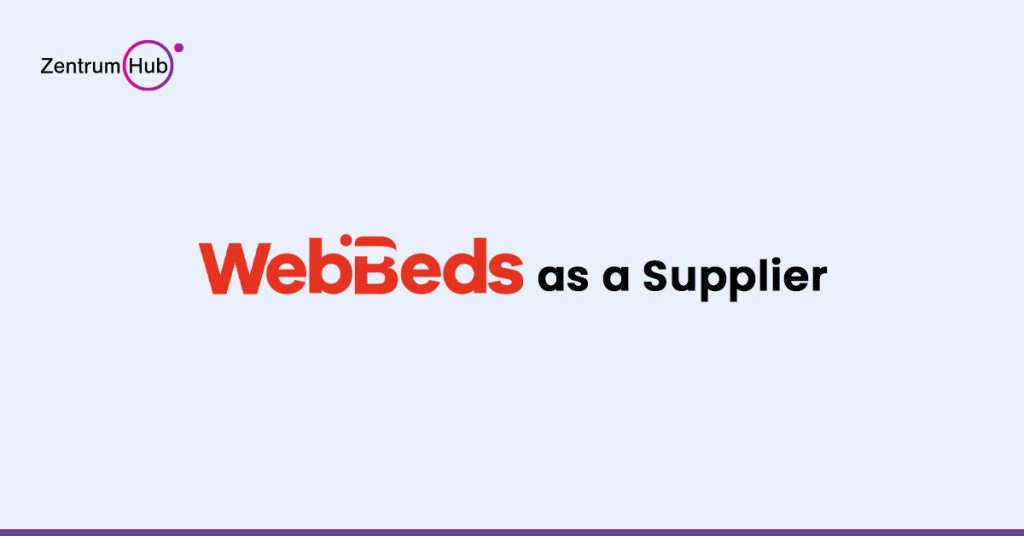
WebBeds as Supplier: Everything You Should Know Before Integrate? Introduction The overview of WebBeds API (DCML) In Summary WebBeds is a renowned global online marketplace that offers a platform connecting various travel service suppliers to a vast distribution network of travel buyers all around the world. As a mediator, WebBeds collects inventory from travel suppliers, aggregates the content, and displays it on its platform. This platform is then distributed to their vast network of travel trade buyers, who in turn sell it to the public, making it a convenient and accessible way to book travel services suppliers. WebBeds marketplace offers access to more than 500,000 hotels across 39,000 locations worldwide. If you want to expand your distribution platform, integrating WebBeds marketplace’s global portfolio of hotels could be an excellent opportunity to access a diverse range of accommodation options worldwide. Let’s understand how integrate WebBeds as a supplier with its API suite – (DOTWconnect Markup Language) or as they like to call it DCML. The overview of WebBeds API (DCML) WebBeds is a global travel hotelMEt wholesaler that offers a vast range of hotel products. WebBeds has developed an XML-based interface called DOTWconnect Markup Language (DCML) to manage reservations and access information on their product range. This interface provides access to a proprietary reservation system, which includes over 25,000 negotiated rate properties and standard rates at over 10,000 properties. DCML standardizes the requests and responses to the different sources, providing a coherent product with a single communication interface. By using DCML, travel companies can easily access and manage reservations for WebBeds’ extensive product range. Standard Protocols Go-Live Process: To begin testing, you will need to contact the WebBeds sales department and request test credentials. Remember that all transactions conducted through the DCML Test system are solely for testing purposes. While the system functionality remains the same between the Test and Live systems, bookings made in the Test environment are not forwarded to the suppliers. Once your development is complete, kindly contact the WebBeds sales department to activate access to the Live server. Development Phase: After receiving your test credentials, you can begin developing your application or framework. The communication process is simple and involves exchanging XML messages (request-answer/response) between your system and DOTWconnect. All requests should be posted (using the POST method) via HTTP or HTTPS protocols to xmldev.dotwconnect.com/request.dotw. The system will respond regardless of whether the request was successfully processed and will inform you of the outcome of the operation. For more information on request and response formats, please refer to the dedicated area of each request. Hotel Communication Structure To help you process your hotel reservations, we have compiled a list of communication methods you can use to connect with the DOTWconnect server. Each method has a detailed explanation of the corresponding request and response formats. This information will assist you in selecting the appropriate communication method that suits your needs. DOTWconnect server has the following XML requests commands for hotels: searchhotels getrooms savebooking confirmbooking getbookingdetails updatebooking cancelbooking bookitinerary deleteitinerary searchbookings Hotels Communication Structure General Request Searchhotels: This method retrieves hotel details such as starting price and availability based on specific search criteria provided in the XML request. The criteria may include the date range, city, and passenger room occupancy, among others. When making a request through DOTWconnect, there are two sections that need to be included: bookingDetails and return. The bookingDetails section contains important information about your travel dates, room occupancy, and preferred currency for pricing. The return section includes details about filtering and room information for each hotel in the response list, but only if the getRooms element is set to true. It’s worth noting that the company offers both serviced apartments and hotels through its searchHotels method. You can examine the ratings in their XML responses to distinguish between the two. Serviced Apartments can be identified by their rating, which will have the value 48055. If you want to filter the results and retrieve only serviced apartments in the response, you can filter the rates using the filter: rating – filters the hotels based on the classification (star rating) (fieldTest: equals, in) Getrooms Clients must use a specific request to retrieve a comprehensive list of all room types along with their respective rates and availability details for a chosen hotel. It is important for clients to incorporate validation checks in this step to ensure that the details returned at the property level are accurate. This is because some of the results returned in the availability response may be extracted from cache systems, which could potentially contain outdated information. When you make a request to block particular room types in the DOTWconnect system, you will receive an encrypted string as a response. This string can be used in subsequent requests to maintain the blocked room types until the booking process is completed. However, please note that the system will hold these blocked rooms for a maximum of 5 minutes only. It’s essential to keep in mind that the 5-minute blocking time is guaranteed only for FIT contracts. Confirmbooking This request is to generate an itinerary that includes one or more successfully booked rooms or services. Each booked room or service will have a unique reference number or booking code, which can be modified or cancelled as required. If multiple rooms or services are booked in one booking flow, they will be grouped together under the same itinerary number. The confirmbooking method provides the option of creating a new itinerary or adding services to an existing confirmed itinerary. Searchbookings This method provides details of all the bookings made by a customer on the WebBeds platform. The details include passenger names, booking status, and booking codes, which are filtered based on the criteria specified in the searchBookings request. Want to Know More? Explore Other Hotel Suppliers WebBeds as Supplier: Everything You Should Know Before Integrate? Key Aspects to Know Before Including HotelBeds as a Supplier Know About Agoda as a Supplier – Types, Steps, Time for API Integration Know
How to Choose Payment Gateways for OTAs?
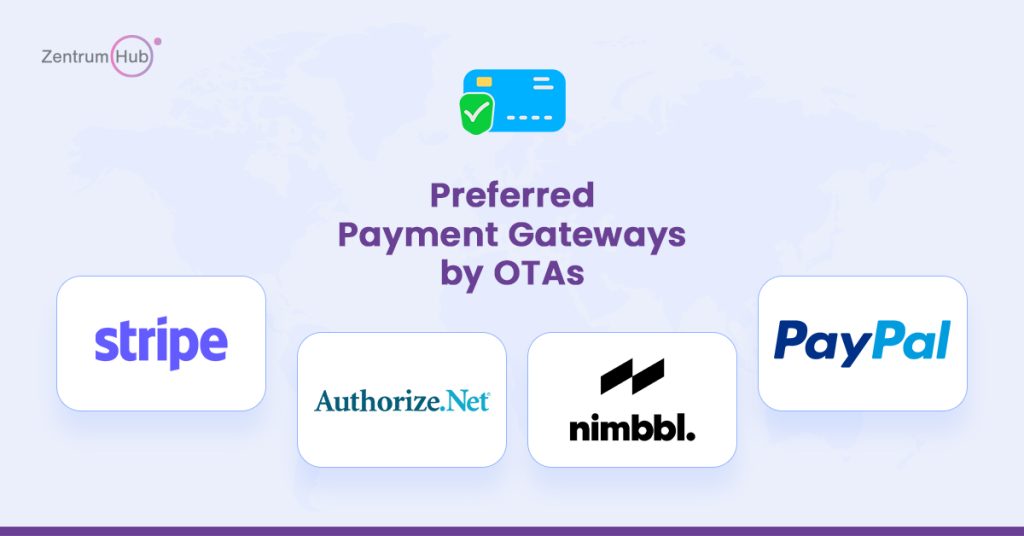
How to Choose Payment Gateways for OTAs? Overview Payment Gateways Preferred by OTAs Factors to consider While Choosing Payment Partner for OTA? Understanding Payment Integration Methods Navigating the Legal Landscape: PCI DSS and Merchant of Record What Payment Gateways does ZentrumHub offer? Concluding Thoughts Online Travel Agencies (OTAs) face fierce competition in today’s digital travel landscape. Travelers expect a seamless booking experience, and a clunky checkout process can be a dealbreaker. This is where selecting suitable payment gateways becomes crucial. In this blog, we’ll explore the most preferred payment gateway options for OTAs and the factors to consider when making your choice. We’ll equip you with the knowledge to ensure a smooth customer checkout journey, boost conversions, and build traveler loyalty. Payment Gateways Preferred by OTAs When it comes to payment gateways for OTAs, several options stand out: Stripe: A globally recognized leader, Stripe offers a user-friendly interface, robust security features, and support for a wide range of credit cards, debit cards, and alternative payment methods like Apple Pay and Google Pay. Additionally, Stripe caters to the growing trend of Buy Now Pay Later (BNPL) options, integrating with Affirm, Afterpay, and Klarna, which can be particularly attractive to budget-conscious travelers. Stripe charges 2% for cards issued in India and 3% for cards issued outside India. Authorize.net: A well-established player, authorize.net provides a secure platform for handling various payment types. It offers fraud prevention tools and recurring billing functionalities, making it suitable for subscription-based travel services. However, its customizability options might be less extensive than those of some newer players. Nimbbl: This emerging player focuses on the travel industry, offering features tailored to OTA needs. Nimbbl boasts features like real-time currency conversion, support for local payment methods, dynamic pricing capabilities, and catering to a global traveler base. Beyond these popular options, several other payment gateways cater to specific needs: PayPal: A widely recognized digital wallet solution, PayPal offers a convenient checkout experience for customers with accounts. Regional Payment Gateways: For an international reach, consider integrating regional payment gateways popular in specific markets, like Alipay for China or UnionPay for transactions within mainland China. Factors to consider While Choosing Payment Partner for OTAs? Selecting the right payment gateway requires careful consideration of several factors: Security: Data breaches are a significant concern. Ensure your chosen gateway prioritizes robust security measures like PCI compliance and fraud prevention tools. Payment Methods Supported: Cater to your target audience by offering a variety of payment methods, including credit cards, debit cards, digital wallets, and local payment options. Global Reach: If you cater to international travelers, consider a gateway that supports multiple currencies and facilitates seamless cross-border transactions. Transaction Fees: Compare processing fees and additional charges associated with different gateways to optimize your financial bottom line. Integration Ease: A smooth integration process is essential. Look for gateways with user-friendly APIs and developer tools to ensure quick and efficient implementation. Customer Support: Reliable customer support is crucial for resolving any issues arising during transactions. Understanding Payment Integration Methods Now that we’ve explored popular payment gateway options let’s delve into the different integration methods: Hosted Payment Gateways: These are the simplest to set up. Customers are redirected to a secure payment page hosted by the gateway provider to enter their payment information. This ensures a high level of security but offers less customization for the checkout experience. Self-Hosted Payment Gateways: With this method, the payment information is collected directly on your website. This offers greater control over the checkout flow but requires significant technical expertise to ensure security and PCI compliance. API-Hosted Payment Gateways: This approach provide more flexibility than hosted gateways. You integrate the gateway’s API into your website, allowing for a customized checkout experience while still leveraging the gateway’s security features. However, implementation requires some technical knowledge. Local Bank Integration Gateways: This method connects directly to local banks in specific regions, enabling real-time bank transfers or direct debits. This can be beneficial for targeting particular markets but may require additional partnerships and compliance considerations. Navigating the Legal Landscape: PCI DSS and Merchant of Record Payment Card Industry Data Security Standard (PCI DSS): This security standard is a global mandate for any organization that stores, transmits, or processes cardholder data. When selecting a payment gateway, ensure they are PCI DSS compliant. This provides peace of mind that your customer’s financial information is protected according to industry best practices. Merchant of Record (MOR): For OTAs that outsource payment processing entirely, partnering with a Merchant of Record can be a strategic decision. A MoR assumes full responsibility for PCI DSS compliance and financial transactions, allowing OTAs to focus on selling travel products and services. However, this also means relinquishing some control over the customer payment experience and potentially incurring additional fees associated with the MOR service. The decision of whether to become your Merchant of Record or outsource to a third-party provider depends on several factors: Technical Expertise: Managing PCI DSS compliance requires ongoing vigilance and technical expertise. If your OTA lacks the in-house resources, partnering with an MOR can be wise. Transaction Volume: The cost of PCI DSS compliance can be significant for OTAs with a high volume of transactions. An MOR might offer economies of scale, making it a more cost-effective option. Control Preferences: Some OTAs prioritize complete control over the customer journey, including checkout. In this case, becoming your own MOR might be preferable. Concluding Thoughts In conclusion, selecting the right payment gateway and deciding on the Merchant of Record approach are crucial for OTAs. By carefully considering the above factors, OTAs can ensure a secure and streamlined checkout experience for their customers, fostering trust and driving business growth. Read more useful blogs for Travel Agencies (OTAs) How Slow Booking System Can Ruin Online Travel Agencies? Why Traditional Hotel Booking Methods Are Costing You Time and Money? Should OTAs Prefer In-House VS Outsourcing Tech Solutions How to Choose Payment Gateways for OTAs? 8 Factors to Consider Before Choosing the Right Hotel Supplier for OTAs How Can B2B
8 Factors to Consider Before Choosing the Right Hotel Supplier for OTAs
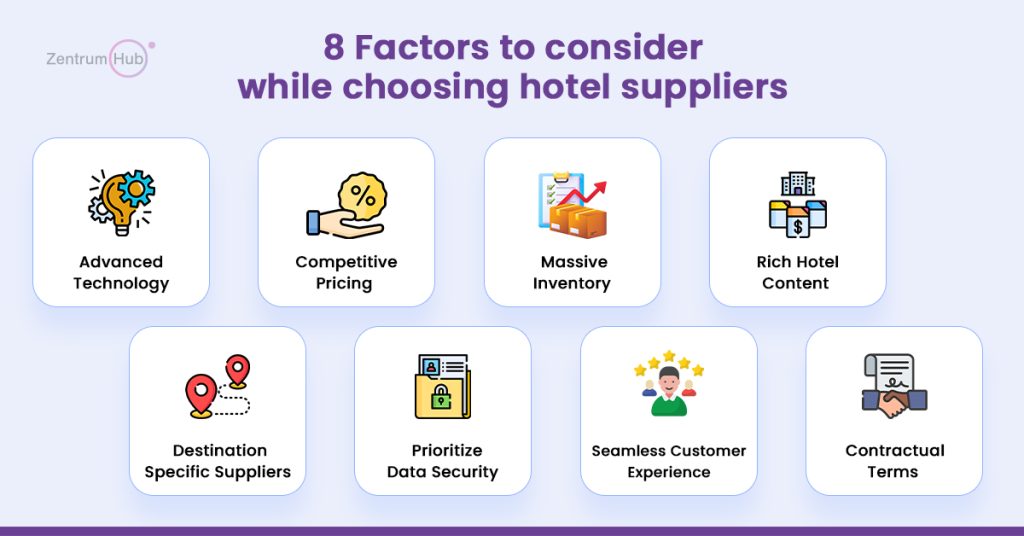
8 Factors to Consider Before Choosing the Right Hotel Supplier for OTAs Overview 8 Considerations while selecting Hotel Suppliers To Conclude Zentrum Connect: A Unified API Supplier In the ever-evolving world of online travel agencies (OTAs), finding the right hotel supplier is like steering your ship through tidal waves. You need partners who can provide the most sought-after destinations, accurate information, and seamless booking experiences. But with a vast ocean of options, how do you chart a course towards success? This blog will act as a guide to equip you with the knowledge to identify the perfect hotel supplier, ensuring a smooth journey to increased bookings and happy customers. 8 Considerations while selecting Hotel Suppliers Selecting a hotel supplier could be based upon multiple factors, let’s learn more about them. 1) Advanced Technology It’s no secret that technology has become an integral part of every business. As an OTA, it’s essential to collaborate with a hotel API supplier that offers flexibility and scalability that aligns with your platform. A supplier with advanced technology and reliable hotel booking API is crucial. Furthermore, having a smooth integration, a rigorous certification process, comprehensive documentation, and technical support are all essential factors to consider. 2) Competitive Pricing It is essential to ensure that the hotel API supplier offer competitive rates that align with your business models and target audience be it budget travelers or luxury seekers, or corporate. Frequent Updates: Verify the supplier provides frequent and accurate price updates to avoid discrepancies and customer dissatisfaction. Reasonable Commissions: Negotiate commission rates that are fair and allow your OTA to achieve its revenue goals. Customization Flexibility: Choose a supplier that allows you to configure and use custom rates for specific customer segments. Member Benefits: If you have a membership program, look for a supplier that offers closed user group (CUG) rates for your members. Inventory Range: Consider the type of accommodation your target market seeks. For example, a good coverage of affordable options like 3 or 4-star hotels, hostels, and apartments. Focusing on these key aspects can help you select a hotel API supplier that supports your business model, pricing strategy, and customer needs, ensuring that your online travel agency platform can achieve its revenue goals. 3) Massive Inventory Selecting the right hotel booking API supplier with a proper inventory is crucial. Your customers have a wide range of preferences when it comes to hotels, so you need a supplier that offers a vast selection of properties in popular destinations such as Expedia, Agoda, and more. Choosing suppliers that provide real-time availability and rates can help your OTA offer accurate and seamless booking experience for your customers. 4) Rich Hotel Content Accurate hotel information is crucial for travel businesses that includes details like room availability, photos, star ratings, and even geocodes for mapping. With this information, customers can make confident booking decisions. In turn, this builds trust and loyalty, ultimately boosting sales. 5) Destination Specific Suppliers One of the most important aspects of running OTA is to partner with destination specific suppliers as they have a strong presence in their region. They can also provide you with the best hotel inventory, products and competitive prices which can then generate a good number of sales. Thus, identifying what destination your customers might like to visit, you can choose a particular supplier in the region to expand your reach as well as revenue. 6) Prioritize Data Security Choose a supplier with a strong commitment to protecting your customers’ information. Look for evidence of compliance with industry regulations and security best practices. This might include robust encryption protocols, firewalls, and other measures to safeguard sensitive data. 7) Seamless Customer Experience Prioritize suppliers offering exceptional online customer support. A robust operational infrastructure is equally important. They should handle post-booking confirmations efficiently and address customer inquiries promptly, ensuring a smooth experience for your travelers. Consider a supplier that offers 24/7 support to address booking issues quickly, minimizing customer frustration and ensuring a smooth experience. 8) Contractual Terms The supplier you choose could make or break your OTA’s success. That’s why it’s crucial to ensure that their contract terms align with your business objectives and goals. You need to make sure that the contract includes all the essential details, such as the supplier’s obligations, your obligations, pricing, termination, and dispute resolution. A contract with unclear or unfavorable terms could lead to misunderstandings and conflicts that could hurt your business in the long run. To avoid this, work with a supplier that offers flexible contract terms and is willing to negotiate terms that work for both parties. By paying attention to these details, you’ll be setting your OTA up for success and ensuring a strong partnership with your supplier. Building a Strong Partnership To ensure a successful collaboration, consider a supplier’s reputation for providing high-quality hotel inventory and reliable service. Research online reviews, testimonials, and references from other OTAs. Ideally, speak with existing clients to gauge their satisfaction. To Conclude As an OTA, choosing the right hotel API supplier can make all the difference in delivering an exceptional booking experience to your customers. A supplier who can offer a vast inventory, competitive pricing, reliable technology and API, excellent support, and a great reputation in the industry is critical. It’s essential to ensure that the supplier’s contract terms align with your business goals and objectives and that they are willing to work with you to achieve your OTA’s success. Consider these factors when carefully selecting a supplier, and you’ll be well on your way to providing your customers with a top-notch travel booking experience. Zentrum Connect: A Unified API Supplier Having a trusted hotel API supplier is a must for an OTA, which is why you should consider Zentrum Connect. Zentrum Connect acts as a bridge between travel businesses and a vast network of travel suppliers, all through a single, unified API. This eliminates the need for individual integration with each supplier, saving businesses significant time and resources. Connect to over 60+ travel
B2C White Label Travel Platform – Launch Your OTA Quickly
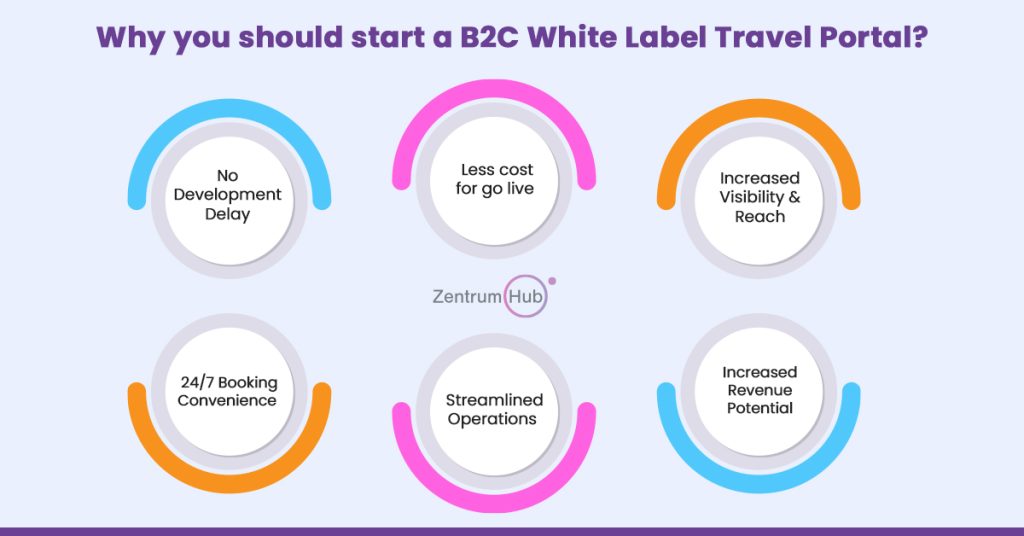
B2C White Label Travel Platform – Launch Your OTA Quickly Overview The Importance of a B2C White Label Travel Portal B2C White Label Travel Portal-Wide Range of Services The Benefits of a B2C White Label Travel Portal Alternate options for B2C White Label Why a B2C White Label Travel Portal is Your Key to Growth? From brochures to browsers, the travel industry has adapted rapidly to the needs of the digital age. This resulted in a shift of consumer behavior, pivoting more towards online booking platforms rather than traditional bookings. However, this gave rise to a competitive cutthroat market for online travel agencies trying to stay relevant by implementing a self booking option for their users to take their own respective businesses to the next level and stay relevant Now, to cater to this demand and stay relevant within a limited budget, travel agencies can use a white-label solution. With this option, the investment is minimal, but going online has some limitations. The Importance of a B2C White Label Travel Portal The online travel market is splitted into various means such as online travel agencies (OTAs), B2B, niche travel specialists, destination specific agencies, and many more. This makes it crucial for travel agencies to differentiate themselves and provide a seamless online booking experience. Here’s why a B2C White Label Travel Portal is important for a starter travel agency: No Development Delay Less Cost for going Live Increased Visibility and Reach allows agencies to tap into a wider audience of potential customers who are actively searching for travel deals online. 24/7 Booking Convenience can give travelers options to compare prices, and book their trips at any time, significantly boosting convenience and customer satisfaction. Streamlined Operations automates many manual tasks associated with booking travel, freeing up your time to focus on providing personalized service to your clients. Increased Revenue Potential: The portal opens new revenue streams by allowing you to offer a wider range of travel products and services on your portal. B2C White Label Travel Portal-Wide Range of Services B2C white label travel portals extend far beyond basic flight and hotel bookings. They provide a comprehensive suite of travel services, empowering you to cater to a broader spectrum of traveler needs. Here’s a glimpse into the extensive range of services you can provide through your portal: Flights: Compare and book flights from a variety of airlines, including domestic and international carriers. Hotels: Access a vast inventory of hotels across all categories, from budget-friendly options to luxury resorts. Vacation Packages: Create and offer pre-designed vacation packages that bundle flights, hotels, and activities, catering to specific traveler interests. Car Rentals: Allow customers to rent cars directly through your portal, ensuring seamless transportation during their trip. Activities and Tours: Integrate with local tour operators and activity providers to offer a wide range of experiences, enriching travelers’ itineraries. Travel Insurance: Offer travel insurance options to provide peace of mind and protect travelers from unforeseen circumstances. Visa and Passport Assistance: Simplify the travel planning process by offering assistance with visa applications and passport renewals. Read also B2B White Label Travel Portal: Quick Guide for OTAs The Benefits of a B2C White Label Travel Portal A B2C white label travel portal offers numerous benefits for online travel agencies. This makes them an attractive and cost-effective solution for scaling your business. Here’s a closer look at some of the key advantages: Reduced Cost and Time Investment: Bypassing the high costs and long development times of custom platforms, white label travel booking software offer a pre-built, ready-to-deploy solution that’s both quick and affordable. Scalability and Flexibility: White label portals are designed to scale alongside your business which means you can effortlessly add new features and functionality as your agency grows, ensuring your platform meets your evolving needs. Real-time Inventory and Competitive Pricing: B2C portals integrate with leading travel suppliers, ensuring access to real-time inventory and competitive pricing for flights, hotels, and other travel components. Content Management System (CMS): Most portals offer a CMS that allows you to manage your website content, including adding travel packages, promotions, and destination information. Marketing and Sales Tools: White label solutions come equipped with built-in marketing and sales tools, such as email marketing and customer relationship management (CRM) capabilities. Alternate options for B2C White Label While B2C white labeling offers a fast solution for travel agencies, there are alternative approaches to consider: Suppliers’ White Label Offerings: Many travel suppliers (like hotels or activity providers) offer white label versions of their booking platforms. This means the agency can use the supplier’s booking system but customize it with their own branding (logo, colors, etc.). This is a quick and easy option, but it may limit the level of customization and functionality compared to other choices. White Labels from Online Travel Agencies (OTAs): Some Online Travel Agencies (OTAs) like Booking.com offer B2B (business-to-business) functionality. This allows travel agencies to get white-labeled versions of the OTA’s booking platform. This offers more features and customization than supplier options but may lock the agency into the OTA’s ecosystem. TAAPs (Travel Agent Application Programming Interfaces) and Third-Party Booking SaaS Providers: TAAPs are essentially building blocks for travel booking software. For example, Booking.com offers TAAP through their Booking.com for Developers program. These TAAPs can be integrated with third-party booking SaaS (Software as a Service) providers like Zentrumhub. This offers the most flexibility and customization for the agency but requires more technical expertise to set up and manage. Why a B2C White Label Travel Portal is Your Key to Growth? By embracing this technology, you can outpace the competition by staying ahead of the curve by offering a convenient and user-friendly online booking experience that caters to modern travelers’ needs. Delivering exceptional customer service by freeing up your valuable time to focus on providing personalized service and building lasting relationships with your clients. And by becoming a one-stop travel shop you can expand your service offerings and cater to a broader range of travel needs, allowing you to become a trusted travel
How Can B2B Hotel Booking Portal Save Your OTA Business Time & Money?
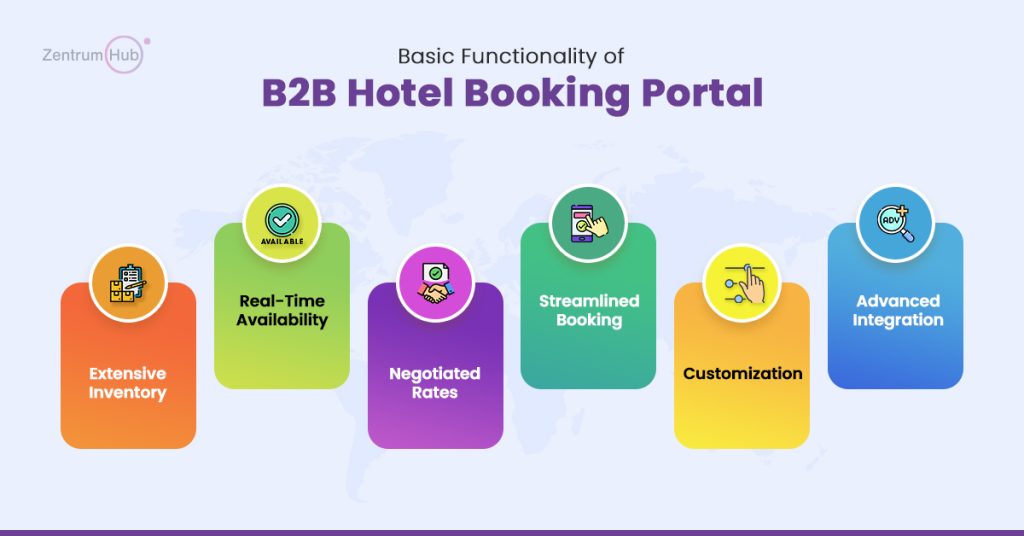
How Can B2B Hotel Booking Portal Save Your OTA Business Time & Money? Overview What is a B2B hotel booking portal and its basic functionality? How does a B2B hotel booking portal work? What are the benefits of using a B2B hotel booking portal? Conclusion As the travel industry grows significantly, efficiency has become the key aspect of travel businesses. Come to think of it, managing hotel bookings has become a time-consuming hassle for travel agents and corporate travel managers. To lower these tedious tasks, having a B2B hotel booking portal comes in handy as it offers streamlined solutions for securing the best accommodations for your clients or employees. Let us learn about all the intricacies of B2B hotel booking portals, their core functionality and the benefits they provide to your business. What is a B2B hotel booking portal and its basic functionality? A B2B hotel booking portal connects hotels with travel agents and companies to fill rooms with exclusive deals. Let us breakdown the basic functionalities of the platform below: An extensive hotel inventory offers a vast selection of hotels across multiple locations, that helps the user to find suitable accommodation for specific needs. Real-time availability & pricing helps users to check room availability and pricing instantly along with accurate information for informed booking decisions. Negotiated rates are considered as secure special discounted rates with hotels that are exclusive to businesses. Streamlined booking process facilitates a user-friendly booking experience, granting quick reservations and efficient management of travel needs. Customization options caters to specific business needs for easier booking management. Advanced integration may allow the B2B hotel booking platform to connect with other travel tools like flight booking platforms, creating a one-stop shop for managing all travel arrangements. How does a B2B hotel booking portal work? A B2B hotel booking platform acts as an enabler between hotels and businesses. Let’s breakdown the process for hotels and businesses. For Hotels: Registration helps hotels sign up with the B2B hotel booking platform, providing details like property information, room descriptions, amenities and photos. Inventory & rates provides hotels with the option to set their room inventory and negotiate rates with the portal, often including special offers for B2B users. Promotion & visibility showcases hotel listings to a network of travel agents, corporate travel managers, and wholesalers, increasing the hotel’s outreach and potential for bookings. Real-time management allows hotels to manage their room availability and rates in real-time through the portal’s dashboard. Bookings & Payments: After a booking is made through the portal, the hotel receives updates and handles guest communications and stay fulfilment. Payment is processed directly by the portal or handled by the hotel depending on the arrangement. For Businesses: Registration with the portal is carried out by travel agents, corporate travel managers, or wholesalers, providing their business information and credentials. Hotel Search & Availability is based on various criteria like location, price, amenities, and guest needs. In addition, real-time availability ensures accurate booking decisions. Pre-Negotiated Rates helps businesses leverage special rates offered by the portal, in return saving on accommodation costs. Streamlined Booking offers a user-friendly interface for quick and efficient booking, often with features like bulk booking options. Reporting & Management keeps track of the business by managing bookings, generating reports, and tracking travel expenses. A B2B hotel booking portal creates a smooth and efficient process for hotels and businesses. Here hotels benefit from increased exposure and well-organized booking management, while businesses benefit from cost savings, wider options, and a user-friendly booking experience. What are the benefits of using a B2B hotel booking portal? There are numerous benefits to using a B2B hotel booking portal for businesses, travel agents, and corporate travel managers. Apart from efficiency, value, improved travel management, and cost savings, there are also a few additional benefits such as: Increased Visibility for Hotels helps to gain access to a wider network of potential clients through the portal’s reach. Improved Customer Service helps businesses leverage the portal’s customer support for resolving the issues related with bookings or platform. Global Reach seems easier if the portal supports multilingual support and mobile app compatibility cater to a global travel market, simplifying international bookings. Conclusion In today’s fast-paced travel industry, efficiency reigns supreme. B2B hotel booking portals offer a powerful solution for OTAs (Online Travel Agencies) seeking to streamline operations and maximize profits. By leveraging a B2B portal’s extensive inventory, real-time functionality, and pre-negotiated rates, OTAs can significantly reduce the time and resources spent on hotel bookings. This translates to cost savings for your business and competitive travel packages for your clients. Moreover, B2B portals offer a user-friendly platform for managing bookings, generating reports, and simplifying travel expense tracking. With features like bulk booking options and integration with other travel tools, B2B portals empower OTAs to deliver a seamless booking experience for their clients. So, if you’re looking to transform your OTA business into a time-saving and cost-effective travel booking powerhouse, then a B2B hotel booking portal is the key. Embrace the future of travel management and unlock a world of efficiency and profitability for your business. Read more useful blogs for Travel Agencies (OTAs) How Slow Booking System Can Ruin Online Travel Agencies? Why Traditional Hotel Booking Methods Are Costing You Time and Money? Should OTAs Prefer In-House VS Outsourcing Tech Solutions How to Choose Payment Gateways for OTAs? 8 Factors to Consider Before Choosing the Right Hotel Supplier for OTAs How Can B2B Hotel Booking Portal Save Your OTA Business Time & Money? 4 Data Analytics for OTAs to Improve Customer Experience and Business Operations How Can B2B Hotel Booking Portal Save Your OTA Business Time & Money? What is a B2B hotel booking portal? A platform connecting hotels with travel agents and businesses for discounted rates and efficient booking. How does B2B hotel booking portal benefit hotels? Increased exposure to a wider network of clients. Real-time management of room availability and rates. Promotion through the portal’s network. How does B2B hotel booking portal benefit businesses?
Get Ready for ATM Dubai 2024: The Must-Know Details
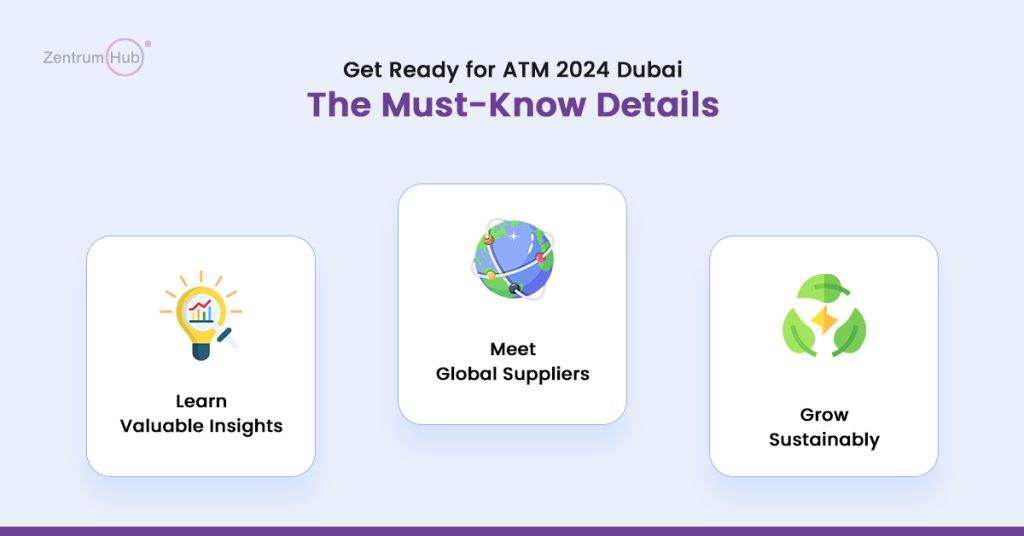
Get Ready for ATM Dubai 2024: The Must-Know Details Overview The Roots Arabian Travel Market 2023 Footfall Stats: A Look Back Arabian Travel Market 2024: Why you should go for It? Become a Part of the Transformation: Exhibiting at ATM 2024 Beyond the Horizon Arabian Travel Market (ATM) 2024 marks the completion of the third decade since the event began in 1994 at Dubai World Trade Centre. What started as an annual travel event with only 300 Exhibitors and 7000 visitors has grown to 2154 exhibitors and 40340 visitors last year. Today, the Arabian Travel Market is much bigger. It helps businesses make deals worth $2.5 Billion every year! Thousands of companies and travel professionals from all over the world attended the event, both in person and online, as ATMs have always been a testament to the Middle East’s captivating appeal. Thus, we celebrate the milestone of a 30-year journey. The story of the Arabian Travel Market uncovers the dynamic boost to innovation and collaboration in the travel sectors. This blog delves into the significance of ATM, its rich history, and the exciting prospects it holds for Arabian Travel Market 2024. The Roots Since its launch in 1994, the Arabian Travel Market (ATM) has steadily grown into a key platform connecting regional tourism businesses with international markets. This fostered long-lasting partnerships that continue to shape the industry’s landscape. Overcoming initial challenges, including navigating cultural nuances and logistical complexities, the ATM event team successfully established itself as a leading platform for international travel industry professionals. This dedication to excellence resulted in rapid growth and recognition, solidifying Arabian Travel Market’s position as a must-attend global travel event. Some of the significant milestones in ATM’s history include: The introduction of dedicated country pavilions showcasing the diverse offerings of various travel destinations. The launch of ATM buyers’ clubs, facilitating targeted business interactions between buyers and sellers. The creation of ATM Travel Tech, a dedicated platform for showcasing the latest travel technology solutions. These initiatives highlight Arabian Travel Market’s commitment to staying at the forefront of the industry and providing a comprehensive experience for all participants. Here are some key milestones: 1994: The inaugural ATM is held, bringing together regional and international travel industry professionals. 2001: ATM expands, reflecting the growing importance of the Middle East as a travel hub. 2010: The event witnesses a record attendance, solidifying its position as a global travel powerhouse. 2020: Due to the global pandemic, ATM goes virtual, showcasing the industry’s resilience and adaptability. 2023: Marking a triumphant return to a physical event, ATM 2023 focuses on sustainable travel practices and post-pandemic recovery. Arabian Travel Market 2023 Footfall Stats: A Look Back The 2023 edition of ATM solidified its position as the leading travel trade event in the Middle East. Here are some captivating statistics: Over 15,000 travel industry professionals participated. More than 100 countries were represented. Exceeding 2,500 exhibitors showcased their products and services. Business deals worth billions of dollars were finalized during the event. These numbers paint a clear picture: ATM 2023 served as a catalyst for industry growth and a testament to the travel community’s collective spirit. Arabian Travel Market 2024: Why you should go for It? The upcoming Arabian Travel Market (ATM) 2024 promises to be a pivotal event, igniting a new era of growth and prosperity for the travel industry. Scheduled for May 6th to 9th, this landmark gathering carries the theme “Empowering Innovation – Transforming Travel Through Entrepreneurship,” reflecting the industry’s remarkable comeback from the pandemic. Key Priorities for ATM Dubai 2024 The rise of travel startups: Innovative and disruptive companies redefining travel experiences. The impact of technology: AI, blockchain, and other advancements shaping the future of travel. Sustainable travel solutions: Initiatives promoting responsible tourism practices and eco-friendly destinations. Entrepreneurial strategies for growth: Insights and guidance for travel businesses to navigate the changing market dynamics. ATM 2024 goes beyond celebration. It serves as a launchpad for travel’s the future of travel by fostering a dynamic environment for entrepreneurship. Startups and visionaries will have a unique platform to showcase their groundbreaking ideas, from transformative technologies to sustainable tourism solutions. This focus on innovation ensures the spotlight shines on the region’s most promising talents and unveils the brimming opportunities within the travel landscape. Collaboration is another cornerstone of Arabian Travel Market 2024. The event acts as a bridge, connecting government officials, industry leaders, and tourism professionals. This strategic interaction fosters dialogue and paves the way for collaborative solutions to the most pressing issues shaping the future of travel. By harnessing the collective ingenuity of stakeholders, ATM 2024 positions itself as a true catalyst for a thriving travel industry. Beyond the business focus, ATM remains committed to its core mission: promoting sustainable tourism and responsible travel. The event goes beyond mere transactions, recognizing the importance of building a sustainable future for generations to come. Arabian Travel Market champions initiatives such as eco-friendly lodging and community-based tourism projects, paving the way for a more responsible and inclusive travel industry. Today, the event goes beyond traditional trade shows, offering Dynamic platform for: Knowledge sharing: Educational sessions, conferences, and workshops led by industry leaders equip attendees with the latest trends and insights. Business networking: Unparalleled opportunities to forge connections with travel buyers, tour operators, airlines, and hospitality providers from all corners of the globe. Product launches and innovation showcase: A platform for companies to unveil their latest offerings and advancements in travel technology, hospitality experiences, and destinations. Become a Part of the Transformation: Exhibiting at ATM 2024 ATM 2024 presents a unique opportunity for businesses to showcase their brand to a global audience of travel industry decision-makers. Network with potential partners and clients. Here’s how you can exhibit at ATM 2024: Visit the official ATM website for exhibitor registration and enquiries. Explore the “Take part in Arabian Travel Market” section for detailed information. Visit ZentrumHub at ATM Dubai 2024 at Booth TT3060 For the first time ever, ZentrumHub is exhibiting at ATM Dubai 2024. This is a fantastic opportunity for us to
Know all about Hotel Booking Engine, Functionality, Cost, Types, and Ways to Build
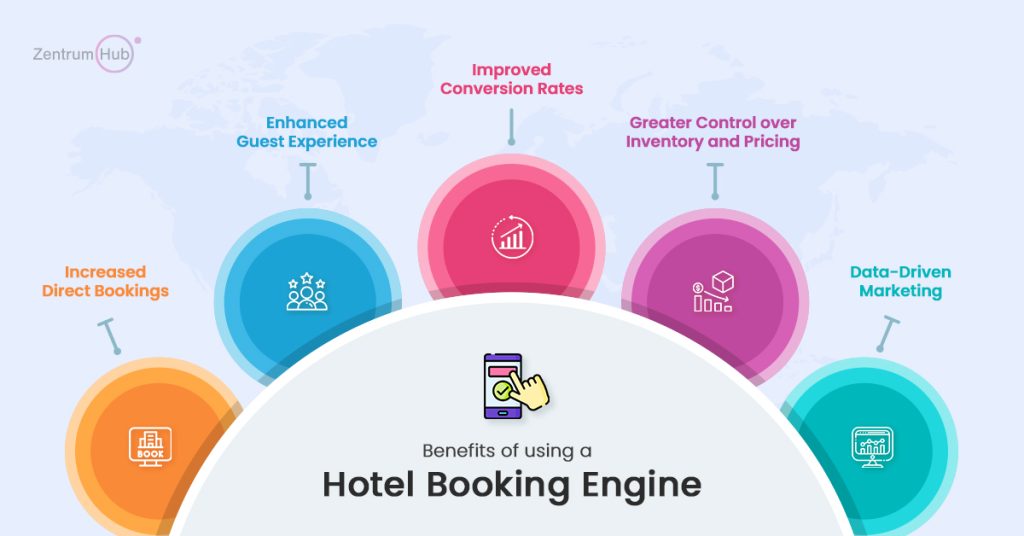
Know all about Hotel Booking Engine, Functionality, Cost, Types, and Ways to Build Introduction What is a hotel booking engine, and what are its basic functionalities? Types of hotel booking engine How does a hotel booking engine work? What are the features of a good hotel booking engine? What are the benefits of using a hotel booking engine? Ways to build a hotel booking engine Concluding Thoughts Over the years, travel has gradually started becoming an increasingly accessible commodity, which has made people worldwide frequently plan trips to explore new countries, cultures, and cuisines. A survey from Skift states that in 2023, online booking of hotel reservations worldwide will surpass the 70% mark. Gradually, travelers prefer the convenience and flexibility of various online booking platforms. The world has come much closer, and travel seems easier. However, this adaptation of the digital landscape in travel has presented hotels with a unique challenge to capture a larger share of online bookings and offer a seamless experience for guests. The solution comes in the form of a hotel booking engine, which, as its basic workings take direct reservations through its website and other online channels, maximizes profits. This blog aims to give you an overview of a hotel booking engine and why it is important to have one for your business. Let’s jump right in! What is a hotel booking engine, and what are its basic functionalities? A hotel booking engine is a software application that is integrated into a hotel’s website, allowing guests to search for available rooms, compare rates and make secure online reservations. In simpler terms, your hotel’s online storefront gives your potential customers a user-friendly platform to complete their booking journey from start to end. The hotel booking engine allows customers to search for hotels, rooms, prices, and locality, compare images/videos, and book rooms via the website or mobile app. A hotel booking engine is helpful for business owners to list hotel room availability, feed hotel information, accept bookings, collect payments, track bookings, & collect reviews. The goal of every booking system is to list inventory and enable online bookings worldwide. The primary purpose of the hotel internet booking engine (IBE) is to detect and process online reservations coming from a hotel/accommodation provider. Other vital roles of the hotel booking engine are: Integrating and syncing with the hotel’s details from all the web pages and sometimes social media pages. Cross-selling services at the time of booking. Managing promo codes and discount rates. Displaying the best obtainable rates to customers against prices available on competitor’s sites. Sending emails at different stages like sign-up, booking confirmation, check-in, and check-out. Types of hotel booking engine Hotel booking engines are categorized into three major types based on business needs: Business-to-Customer (B2C): Used by OTAs to provide hotel inventory to end-users for booking hotel rooms. Business-to-Business (B2B): Used by large hotel suppliers, bed banks, consolidators, and aggregators to sell hotel inventory to other businesses. Business-to-Enterprise (B2E): Preferred by big organizations or corporate companies to regulate bookings for their employees, with added benefits or discounts on hotel pricing. Additionally, multi-channel booking engines integrate various B2B, B2C, and B2E features, providing all-in-one solutions. How does a hotel booking engine work? The basic functionality of the hotel booking engine remains the same across all software. It includes primary features such as inventory management, search functionality, rate display, secure booking process, and integration with PMS. Let’s understand how these functions work. Inventory Management: Managing inventory is the core aspect of your online website. Here, the booking engine connects with your channel managers, suppliers, GDSs, Whole Sellers, Self-Contracted Inventory, etc. This integration ensures real-time room availability and precise rate information, which mitigates the risk of overbooking and makes it a comforting experience for guests. Search Functionality: Every hotel booking engine has search functionality that lets users search for the available rooms according to their needs, viz., dates, number of guests, room types, and desired amenities like staying with breakfast or without and more. The hotel booking engine filters the available options based on chosen criteria, giving the result of what they are exactly looking for. Rate Display: This function shows the user rates of multiple types of rooms and packages with applicable taxes or fees. This adds a layer of transparency for the user to make informed decisions based on their budget and preferences. Secure Booking Process: Once the guests’ journey on your website has reached this point, the booking engine paves the way for a secure online payment process. This process includes collecting guest information, processing secure payments and sending confirmation emails. Integration with PMS/Suppliers: Once the successful booking is carried out, the booking engine automatically updates your PMS or suppliers with new reservation details, ensuring every department in the hotel is aware of the bookings and can arrange the preparation likewise. Read more Ideal Features that a Hotel Booking Engine Must Have What are the features of a good hotel booking engine? Every hotel booking engine software offers some features that enhance the guest experience, simplifying hotel operations. Let’s look at some common features. Mobile-Friendly Design: In recent years, every technology has shifted to a mobile-first approach, which applies to hotel booking engines. A well-designed and developed hotel booking engine comes with seamless mobile optimization across all devices, including smartphones, tablets, and more, catering to the growing trend of mobile booking. Multiple Payment Options: Providing your service to a global audience is no easy feat; thus, keeping a global aspect in mind, the hotel booking engine should support various payment methods like credit cards, debit cards, and secure online wallets. Additionally, offering local payment options can attract customers from specific regions. Promotional Offers and Packages: A competitive hotel booking engine always tends to showcase special offers, packages, and last-minute deals to incentivize bookings and boost revenue. Guest Reviews and Ratings: The world should know about your incredible services, which is why integrating guest reviews and ratings adds credibility that fosters trust with potential guests, significantly influencing booking decisions. Multilingual Support: Like payment methods,
Role of Hotel Booking APIs in Hotel Booking Engine
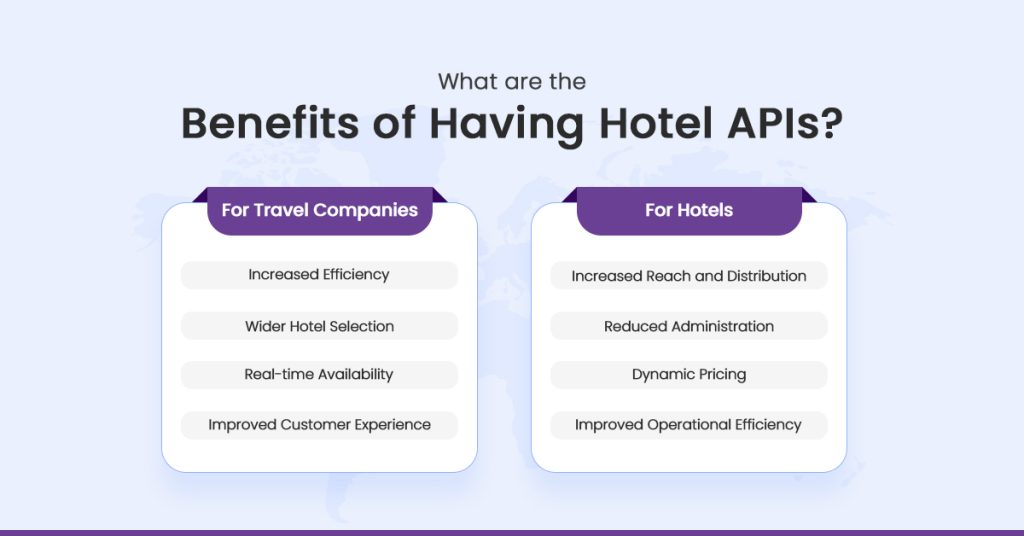
Role of Hotel Booking APIs in Hotel Booking Engine? Introduction What is a hotel booking API? How does the Hotel API work? What are the benefits of having Hotel APIs? How to choose suitable Hotel API? API and Beyond! ZentrumHub is Certified Hotel API Provider & Integration Partner for Hotel Suppliers.Integrated 60+ Hotel Suppliers across the Globe with Hotel Booking Engine! Introduction The travel industry has come a long way from its traditional ways. As the industry started adapting Hotel Booking APIs, it changed the game of online travel booking with highly capable and efficient systems such as OTA that made the whole process easier. As a result, productivity increased, along with customer satisfaction. A report from Statista states that by 2028, online sales will account for 82% of total revenue in the hotel market. Hotel APIs will be one of the significant reasons for this growth. If you are looking to enter the travel industry with your OTA platform, you must understand how a Hotel API system works and how it can help you take your business to the next level. This blog aims to inform you about hotel APIs and how they can revolutionize your online travel booking business. What is a hotel booking API? Simply put, a hotel booking API is a programming interface that connects online travel agencies to various suppliers to gain access to their hotel inventories to showcase on your online travel portal. The Hotel API primarily functions as a catalyst that provides real-time access to room availability, pricing, rich content and more. Travel businesses can leverage Hotel Booking APIs to provide customers with a vast selection of hotels and immediate booking confirmation, enhancing the customer experience. In addition, a Hotel API also helps to streamline the booking process, which mitigates any scope of human errors. However, integrating hotel APIs into travel agency software requires several technical processes, including room mapping, data processing, error handling, and conflict resolution. Thus, it is crucial to understand the API’s intricacies. How does the Hotel API work? Replacing the traditional mediators, the hotel connects to a global or local API, which then connects the hotel with other agency sites that provide a vast, constantly updated database. Here’s a simplified breakdown of how API works. Initiating an API request: The travel company initiates the process by sending a request to the hotel API, specifying search criteria like location, dates, room type, and desired amenities. API communicates with hotel reservation systems: The Hotel API acts as a bridge, communicating with the reservation systems of various hotels or chains based on the specified criteria. This process often involves industry-standard protocols and formats for data exchange. API receives and processes hotel data: The API gets responses from the hotel reservation systems, including details like room availability, rates, descriptions, and amenities. The API may then process and filter this data based on the travel company’s initial request. The API sends a response to the travel company containing relevant hotel information tailored to the search criteria. Travel company displays or utilizes the data: The travel company can then use the received data for various purposes, such as displaying hotel options on their website, allowing users to compare prices, or even facilitating the booking process directly through the API. In essence, hotel APIs streamline the process of accessing and utilizing hotel data for travel companies, enabling them to offer a broader range of hotels, real-time availability, and automated booking functionalities. What are the benefits of having Hotel APIs? Hotel APIs offer a range of advantages for both travel companies and hotels, making them a valuable tool in the hospitality industry. Here’s a closer look at some key benefits: For Travel Companies: Increased Efficiency: APIs automate searching and retrieving hotel data, eliminating the need for manual searches and data entry saving significant time and resources. Wider Hotel Selection: By connecting to multiple hotels and chains through a Single Hotel API, travel companies can offer their customers a wider range of accommodation options, catering to diverse needs and budgets. Real-time Availability: APIs provide access to real-time inventory and pricing information, ensuring customers get the most up-to-date options and preventing overbooking issues. Improved Customer Experience: Travel companies can enhance their customer experience and satisfaction by offering a wider selection, real-time information, and potentially streamlined booking directly through the API. For Hotels: Increased Reach and Distribution: APIs connect hotels to a broader network of travel companies, increasing their visibility and reaching potential customers across various platforms. Reduced Administration: Automating the data exchange process through APIs can reduce hotel administrative burden, freeing up staff time and resources for other tasks. Dynamic Pricing: APIs allow hotels to implement dynamic pricing strategies, adjusting rates based on factors like demand, seasonality, and competitor pricing, potentially increasing revenue. Improved Operational Efficiency: Integrating APIs with hotel management systems can streamline operations, improving inventory management and department communication. Hotel APIs offer a win-win situation for travel companies and hotels, fostering greater efficiency, wider reach, and a more dynamic and competitive hospitality landscape. How to choose suitable Hotel API? To ensure that you select a suitable Hotel for your business, it is necessary to consider the following options: Data Coverage: API offers may differ from one another. Thus, consider whether it offers access to a broader range or specific destination. Depending on your requirements, select the API that fits your needs. Quality of Data: As an OTA, showcasing rich content on your website becomes essential. Providing accurate and updated information ensures the reliability of your customers. Payment Model: The payment model is one of the primary considerations before buying any API. A few APIs have subscription-based models, while others charge based on the number of API calls made or the amount of data accessed. Easy Integration: The main factors here are choosing an API that provides clear documentation, developer tools, and quick support. However, sometimes integrating an API may take months; thus, selecting an API provider who can do this in minimal time with all the factors is a
Why does every OTA need travel agency software?
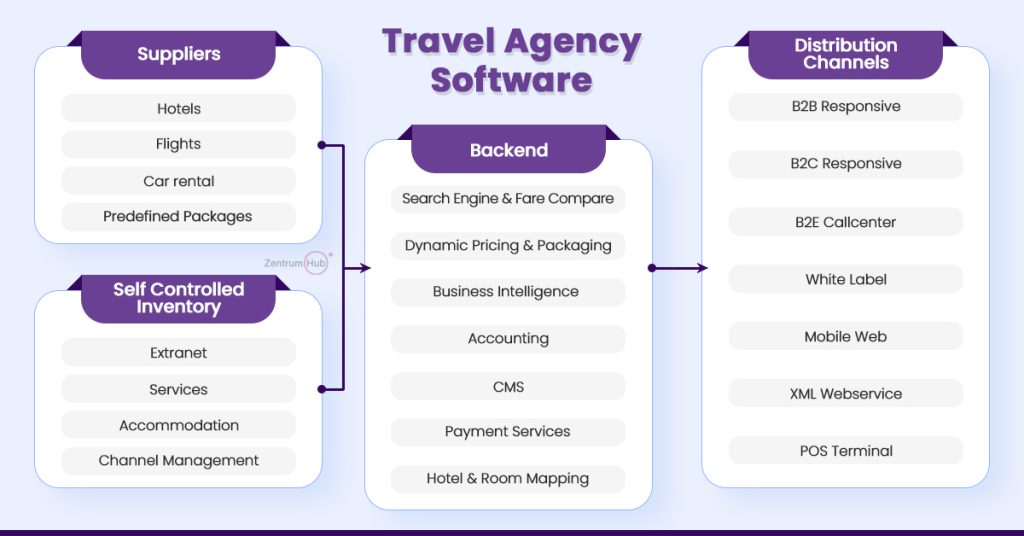
Why does every OTA need travel agency software? Introduction What is a travel agency software and what are the Major Components of it? How can travel agency software help you automate, analyze and attract? What are the modules of travel agency software? What are the modules of travel agency software? Staying Ahead of the Curve Can you imagine a world without online travel booking and mobile apps? Seems impossible, right? However, that was the case two decades ago. Ever since the travel industry has witnessed several changes, traditional travel agencies adapted to the modern methods of the digital age. It feels nostalgic as the days of handwritten itineraries and paper hotel confirmations are behind us; today, instant online bookings and mobile check-ins have replaced traditional methods. Swiping through travel apps and clicking online reviews has become the go-to approach for seeking popular tourist spots and experiencing new destinations. The shift to online travel and hospitality brings benefits like convenience, personalization, and wider choices. Today, Online Travel Agencies (OTAs) have become the forefront face of the industry, and to keep up with the growing demands and expectations of travelers, they must step up their game; that is where travel agency software comes into play. So, what does a travel agency software do? How can it help elevate your business to the next level? We will find all these answers in this blog. Let us dive in! What is a travel agency software and what are the major components of it? Travel agency software acts as a central hub, streamlining the management and automation of your travel business’s sales, bookings, refunds, back office and revenue management. As an OTA, it is essential to know what features of travel agency software you can leverage to upscale your business. We are listing some features below: Booking and Cancellation System: Today, almost every booking is carried out online. As an OTA, it becomes your priority to connect with Global Distribution Systems (GDS), and other hotel and activity suppliers, which will provide access to your end-users with the best deals. Here, travel agency software improves and speeds up the booking process, offering customers more options such as multi-language support, updated pricing, multiple payment options, auto confirmations and notifications. The booking system also allows you to track and manage all bookings in one place, ensuring accuracy and avoiding overbooking. OTAs can receive real-time updates on cancellations and modifications, which allows for proactive communication with customers. Accounting System: Integrating your platform with accounting software is essential. It covers online payment with secure SSL encryption, invoices for both partners and clients, detailed financial statements, sales commission calculations, and data analysis. Accounting systems integrated with various payment gateways to accept credit cards, debit cards, and online wallets streamline the booking process, helping end-users make a hassle-free payment quicker and enhancing their experience. Itinerary building can be a tedious and tricky task as there are too many factors to consider when planning a trip, such as means of transportation, hotels, and exciting events. If an OTA provides all this information in a detailed manner, it becomes much easier for customers to select a tour package that they specifically need. An itinerary software can help you create tour packages with the best touring options for the client’s budget and wish. These tours can be segmented into individual, group or corporate travel plans. A well-designed tour plan with plenty of good features also makes you stand out from other OTAs. Customer Relationship Management Systems are significant when collecting customer data and offering relevant services based on their segment. OTA can utilize this data to create discounted and promotional offers. CRM often provides saving and organizing customer data, segmentation of buyers and providers, and detailed reports on clients, partners, and tours. Additionally, it collects customer reviews, personalized offer development, loyalty programs, newsletters, and more. Access to crucial data unlocks fresh marketing opportunities. However, visibility is the key. Equipped with effective marketing tools, you can create targeted campaigns, manage social media presence, and build strong customer relationships, making advertising more effective and customers happier. Read More Integrating Payment Systems into Your Travel Agency Software How can travel agency software help you automate, analyze and attract? Depending on the different functionality, travel agency software can make your OTA more efficient. Most companies prefer ready-to-go solutions. However, you can also opt for tailored solutions as they give more customization options based on your needs. Below are a few options that you should consider: Business Expenses: Automation has become an integral part of the digital world. Utilizing travel agency software for registering requests and answering questions through chatbots eases the human efforts required for this minimal task. Automating these processes can free your team to focus on strategic marketing and improving customer services. Data Management: Cloud-based services allow OTAs to access data from sales reports, bookings, payments, and individual preferences, which can help you improve the operational process across different levels. By doing this, you can ensure that you are meeting the demands and expectations of consumers. Supplier Database: Whether you are a giant travel platform or SME, your OTA needs supplier databases, as they can help you expand your business in various geographic locations. Suppliers have numerous inventories, from large hotel chains to local lodges. You can access these inventories with the help of booking APIs. Client Management: Based on consumer behaviors, booking history, and transactions, you can easily create custom packages for frequent travelers, offering discounts. This data can also help you create loyalty programs that increase brand value, retain existing customers, and attract newer ones. Read Also How to Enhance Customer Experience with Travel Agency Software? What are the modules of travel agency software? What are the modules of travel agency software? Modules are the core functionalities of any travel agency software that offers you a comprehensive overview of the capabilities that are beneficial for online travel agencies. Below are a few modules of travel software. Hotel Contracting Module: This module allows OTAs to


